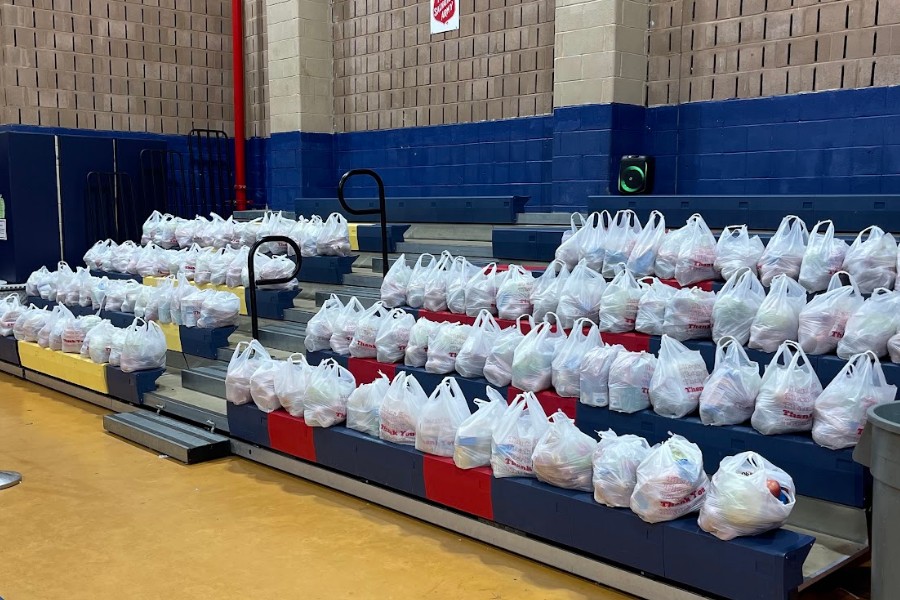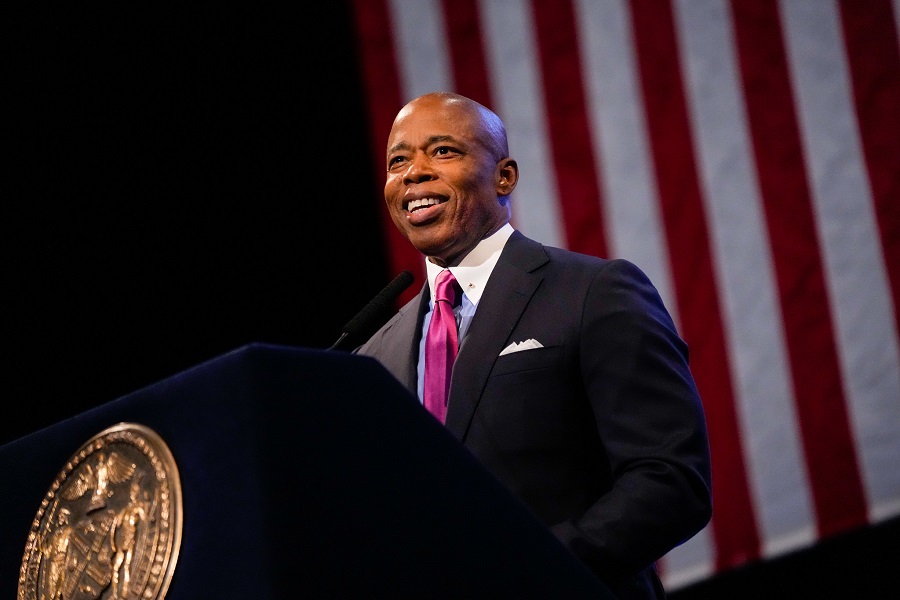
State Senators and Assembly Members joined Hunger Solutions NY, Feeding NY State, and food banks from across the state to call for a state budget that addresses NY’s hunger crisis.
One in ten New Yorkers, including nearly one in six children, struggle with hunger. The FY2025 state budget is a critical opportunity for Governor Hochul and the State Legislature to fund vital anti-hunger programs that will ensure all New Yorkers can put food on the table.
Today advocates called on New York State to: Increase the Supplemental Nutrition Assistance Program (SNAP) minimum benefit to $100 per month, up from the current federal minimum benefit of $23 per month. Restore full funding for SNAP outreach and application assistance through the statewide Nutrition Outreach and Education Program.
Increase funding for Nourish New York and the Hunger Prevention and Nutrition Assistance Program. Fully fund Healthy School Meals for All New York Kids, so all students statewide have access to school breakfast and lunch at no cost.
“It is unconscionable that in a state as well-resourced as New York we have one in four New Yorkers suffering from food insecurity. It is time that we take this seriously and act with the urgency that this deserves. That is why I’m urging our legislature and the Governor to fund proposals that we know will put food on our neighbor’s tables and draw down federal dollars. By increasing the SNAP minimum benefit, funding NOEP, and fully funding universal school meals we would be addressing school debt, increasing dollars that are invested in the local economy, and saving families money. These proposals are a win-win. It is also important to note that these proposals have bipartisan support and the support of the business sector. Let’s fund these proposals now and make New York truly affordable and livable,” said Assembly Member Jessica González-Rojas .
The Nutrition Outreach and Education Program (NOEP) helps eligible New Yorkers connect to federally-funded SNAP benefits. NOEP provides free and confidential SNAP outreach and application assistance through local community-based organizations. Last year, the State Legislature added $2 million in funding, allowing for 22 new SNAP assistors in high-need areas and expanded remote services statewide.
Governor Hochul’s FY2025 Executive Budget proposal does not sustain that added funding. If it is not restored, providing a total of $5.503M for NOEP, services will be cut significantly in communities across the state at a time when hunger is on the rise. State SNAP outreach funding is federally matched, and draws down additional federally-funded benefits into New York. NOEP has a more than 27-fold return on investment to the state.
“Food insecurity in New York is both unacceptable and solvable,” said Andrés Vives, Executive Director of Hunger Solutions New York. “These anti-hunger policies are the most effective tools for alleviating food insecurity in our state, and they are modest investments in a more than $220 billion state budget. From New Yorkers who are eligible for SNAP but need help applying, to kids struggling with stigma and hunger at school, we call on Governor Hochul and the Legislature to fully fund these programs to support food security for all New Yorkers.”
“Today, on Valentine’s Day, we come together to celebrate love. There is no greater love than that of a parent for their child. But today, hungry parents all over New York will demonstrate their love by skipping a meal so their children can eat. No one should be forced into such a decision. We live in one of the wealthiest states in the union; we can afford to ensure every New Yorker has enough to eat. The combination of SNAP, HPNAP, Nourish New York and universal school meals, if funded as they should be, will go a long way to ensuring that everyone has enough. These programs are effective in reducing hunger while supporting New York businesses. Please ensure that the final state budget includes a $100 SNAP minimum benefit, $75 million for Nourish New York, $64 million for HPNAP, and let’s finish the job of providing truly universal school meals.” said Dan Egan, Executive Director of Feeding New York State.
SNAP is our nation’s largest anti-hunger program, proven to reduce poverty and food insecurity, improve health outcomes, and stimulate local economies. SNAP benefits are critical, but modest. Nearly three million New Yorkers who rely on SNAP experienced significant cuts when pandemic-era emergency allotments ended in March. Households saw an average loss of $151 per month, with some now only receiving $23 per month for groceries, less than $1 per day. While that minimum benefit is set at the federal level, New York can provide a state supplement guaranteeing a more adequate monthly benefit, which would benefit nearly 110,000 New Yorkers. Two-thirds of registered New York voters support this proposal.
The Hunger Prevention and Nutrition Outreach Assistance Program (HPNAP) and Nourish New York offer critical support to millions of New Yorkers struggling with hunger. The two programs enabled New York food banks and emergency food providers to distribute over 50 million pounds of food last year.
HPNAP supports a network of nearly 3,000 food relief organizations including food banks, food pantries, community-based organizations, and emergency shelters. Nourish New York enables food relief organizations to purchase high-quality, nutritious, and culturally appropriate produce from New York farmers. Since 2020, Nourish New York has provided hungry families with over 70 million pounds of food from over 4,000 producers across the state.
A modest increase in funding – providing $75 million for Nourish New York and $64 million for HPNAP – will ensure emergency food providers have the necessary resources to support hungry New Yorkers. School meals are among the farthest-reaching anti-hunger programs for school-age children. Last year’s state budget included a historic expansion of free school meals, but it did not cover all schools statewide. New data reveal that 320,000 students in nearly 660 schools still lack access to universal free school meals. For less than one-tenth of one percent of the FY2025 budget – $90 million – every student in New York would have access to breakfast and lunch at no cost, free of stigma, paperwork barriers, or meal debt.
Healthy School Meals for All policies are shown to alleviate food insecurity, support learning, and improve students’ mental and physical health. Providing meals at no cost also offers much-needed financial relief to families, saving them an estimated $150 per child each month in food costs. 77% of registered New York voters support state funding for universal free school meals.
Hunger Solutions New York (HSNY) is a statewide nonprofit organization dedicated to alleviating hunger. HSNY provides outreach and technical assistance to maximize access to SNAP, WIC, school meals, summer meals, and other federal nutrition assistance programs across the state. The organization also advocates for state and federal policies to strengthen and expand the reach of federal nutrition programs in New York.
Feeding New York State (FNYS) is the state association of New York’s 10 Feeding America food banks. FNYS sources food for our member food banks while partnering with farmers and the food industry to encourage donations. By fostering relationships with all levels of government, partnering with other anti-hunger organizations, and educating the public, FSNY works to ensure every community in the state has access to good, healthy food.
Photo credit: Seitu Oronde.
- Interview With A Wedding Videographer: Insights And Stories
- Sponsored Love: Luxury Villas In Dubai For Families, What To Look For
- Espaillat Signs Historic Agreement To Enhance Science And Conservation Efforts Between Dominican Republic And NY
- Adams’ Apprenticeship Program Surpasses 15,000 Opportunities In Under Three Years
- Why New Energy Cooling Fans Are Crucial For PV Field Applications
Become a Harlem Insider!
By submitting this form, you are consenting to receive marketing emails from: . You can revoke your consent to receive emails at any time by using the SafeUnsubscribe® link, found at the bottom of every email. Emails are serviced by Constant Contact









